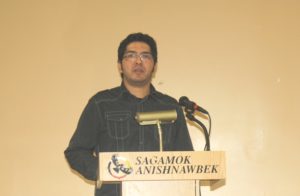Sagamok hosts their first FASD conference

By Leslie Knibbs
SAGAMOK ANISHNAWBEK FIRST NATION—Dennis Trudeau, a parent infant advisor in Sagamok Anishnawbek First Nation, brought together speakers on Friday, November 25, at the Sagamok Anishinabek First Nation’s (SFN) first Fetal Alcohol Spectrum Disorder (FASD) conference to educate others on the issue of FASD.
Presenters included Danielle Brubacher, a Registered Dietician and Certified Diabetes Educator with N’Mninoeyaa (Aboriginal Health Access Centre) and Frances Pine, FASD Coordinator with the Centre.
Many local community members attended.
Trudeau presented a detailed description of how FASD affects an individual, referring to it as a societal problem that can affect anyone in society. Pointing out some of the problems an affected individual must deal with, Trudeau made it clear that there are wide ranging effects on those affected including but not limited to, “lack of being organized, decreased executive function, impulsivity, lack of focus and an increased amount of early school failure.” He said that studies show that at this point, it is difficult to diagnose the number of FASD victims affected by mothers consuming alcohol.
Angus Toulouse, CEO of the North Shore Tribal Council (NSTC), told those gathered, “the [affected] individual growing up is unable to comprehend what is happening or the consequences of their actions.”
Toulouse expressed regret that more service providers are not attending these FASD conferences including teachers.
“I didn’t see those at the recent NSTC conference held earlier this month,” noted Toulouse.
Toulouse was pleased to see the Anishinabek Police Services (APS) in attendance at the North Shore conference. However, no APS staff members were present at Sagamok’s first FASD conference.
The first speaker at the Sagamok conference was Danielle Brubacher, a registered dietician at N’Mninoeyaa, the Aboriginal Health Access Centre. She informed everyone that “alcohol inhibits absorption of much needed essential vitamins such as vitamin D and B for both a mother and a child in the womb”.
She stressed the importance of healthy eating for healthy brain development. Brubacher told those gathered that diet is “all about balance.” She advised that it is recommended that “a food diary” be kept, especially for an affected child thereby allowing for a look back to see if any food sensitivities occur.
Frances Pine, FASD coordinator for the NSTC told those attending that “50% of pregnancies are unplanned and more prevalent than reported.” Further to this, “most pregnancies are not known until six to eight weeks in gestation, [as well] prenatal exposure can affect the fetus as early as three weeks in gestation.”
According to recent studies, Pine said, “[FASD] is not just a ‘native problem,’ as the highest growing demographic at risk for having a child born with FASD is a single Caucasian woman, over 30 years of age, with a post secondary education, who earns $50,000 or more a year.”
Exposure to alcohol to the fetus may come as a result of a pregnant woman consuming “seven standard drinks in any given week of pregnancy, or two episodes of binge drinking of four drinks at one time at any point of the pregnancy.”
There is no cure for FASD. Medical evidence has proven alcohol consumption during a woman’s pregnancy will cause permanent brain damage to a child.
Sagamok’s first FASD conference was short on attendance with about 18 people there; however, everyone there benefitted from a very informative dialogue with experts on the issue. According to Trudeau, the FASD conference will be an annual event in the future.


